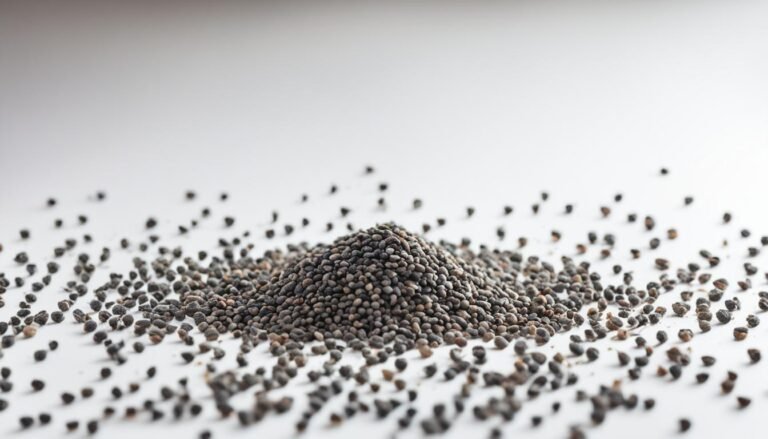Unlock the Health Benefits: Is Sesame Seed Oil Good for You?

Sesame seeds are mostly oil, about 60%. This ingredient has been a staple in cooking and traditional medicine for centuries. Sesame seed oil is full of health benefits. It can help keep your heart healthy and protect your skin from the sun. So, is sesame seed oil good for you? Let’s find out more about this nutritious oil.
Introduction to Sesame Seed Oil
Sesame seed oil is an ancient oil with a long history. It started in India over 3,000 years ago. People used it for cooking, religious rituals, medicine, and skin care. Now, it’s a key ingredient in many global cuisines.
History and Origins of Sesame Seed Oil
Sesame is one of the oldest crops for oil, with seeds up to 60% oil. Most sesame species are wild in the Middle East. But, the cultivated sesame first appeared in India, becoming a big part of cooking and medicine there for thousands of years.
Varieties of Sesame Seed Oil
There are many types of sesame seed oil, each with its own taste and use. Unrefined sesame oil is light, with a nutty smell and taste. It’s great for cooking on low to medium heat.
Refined sesame oil tastes neutral and can handle high heat, perfect for deep frying or stir-fries. Toasted sesame oil has a deep brown color and a light flavor. It’s often used in dressings and marinades.
| Sesame Oil Variety | Flavor Profile | Best Uses |
|---|---|---|
| Unrefined Sesame Oil | Nutty, aromatic | Low to medium heat cooking |
| Refined Sesame Oil | Neutral | Deep frying, stir-fries |
| Toasted Sesame Oil | Delicate, nutty | Dressings, marinades |
Nutritional Profile of Sesame Seed Oil
Sesame seed oil is more than just a tasty addition to your meals. It’s packed with vitamins, minerals, and antioxidants that boost your health. This oil is a great source of nutrients that support your overall well-being.
This oil is full of copper, giving you more than your daily need. It also has a lot of manganese, calcium, magnesium, phosphorus, zinc, selenium, vitamin E, and vitamin B1. These nutrients are key for keeping your bones strong, giving you energy, and helping your immune system work right.
What makes sesame seed oil special is its high antioxidant levels. Sesamol and sesamin are two powerful antioxidants found in it. They help the oil last longer and stay fresh. They also have health benefits like reducing inflammation and protecting your heart.
Adding sesame seed oil to your meals or skincare routine can be a smart move. It’s packed with nutrients that support a healthy lifestyle. Discover how this versatile oil can improve your health from the inside out.
| Nutrient | Amount per Tablespoon |
|---|---|
| Calories | 124 kcal |
| Total Fat | 14 g |
| Protein | 0 g |
| Carbohydrates | 0 g |
| Vitamin E | 0.196 mg |
| Vitamin K | 1.9 mcg |
Antioxidant Properties of Sesame Seed Oil
Sesame seed oil is known for its strong antioxidants. These help keep you healthy. It has sesamol and sesaminol, which fight off free radicals.
Key Antioxidants in Sesame Seed Oil
Sesame seeds are packed with oil and protein, about 40% to 60% oil and 25% protein. The oil is full of linoleic acid, which is 40% to 50% of its fatty acids. But the real heroes are the antioxidants.
- Total tocopherol in sesame oil is 530 mg to 1,000 mg per kg. Gamma tocopherol is the main type, making up 521 mg to 990 mg per kg.
- It also has up to 20 mg per kg of gamma tocotrienol, a strong antioxidant.
- The phytosterol content in sesame oil is 4,500 mg to 18,960 mg per kg. β-sitosterol is 58% to 62% of the total.
Benefits of Antioxidants for Health
Sesame seed oil’s antioxidants are great for your health. They reduce cell damage from free radicals, which can cause inflammation and chronic diseases. Studies show that taking sesame oil supplements can:
- Protect heart cells and boost antioxidants in your body.
- Lower free radical damage and help control high blood sugar in diabetes.
- Stop plaque buildup in arteries, lower blood pressure, and increase HDL (good) cholesterol while decreasing LDL (bad) cholesterol.
Adding antioxidant-rich sesame seed oil to your meals can improve your health and well-being.
Anti-Inflammatory Benefits of Sesame Seed Oil
Sesame seed oil is known for its anti-inflammatory properties. It has been used in traditional Taiwanese medicine for joint pain, toothaches, and cuts. Studies show it can lower inflammation by reducing nitric oxide production. The anti-inflammatory effects of sesame oil are promising, but we need more human studies.
The anti-inflammatory properties of sesame oil come from its nutrients. It’s full of sesamin, sesamolin, and sesamol, which fight inflammation. These compounds lower harmful inflammation markers in the body.
- Sesame oil is 74% more saturated than other seed oils, making it stable and less likely to turn harmful in the body.
- Polyunsaturated fatty acids (PUFAs) in sesame oil can turn into free radicals when heated. So, use it at low temperatures or raw.
- Choose unrefined and organic sesame seed oil for cooking to keep its nutrients and prevent PUFA oxidation.
| Nutrient | Amount in Sesame Oil |
|---|---|
| Saturated Fat | 74% more than other seed oils |
| Polyunsaturated Fatty Acids (PUFAs) | High amounts that can oxidize when exposed to high heat |
| Sesamin, Sesamolin, Sesamol | Potent anti-inflammatory compounds |
Adding sesame seed oil to your meals can help with inflammation. Use it for cooking, on salads, or raw. It’s a great way to support your health.

Heart Health Benefits of Sesame Seed Oil
Sesame seed oil is full of good stuff for your heart. It has 82% unsaturated fats, including omega-6 fatty acids. These are key for a healthy heart.
Impact on Cholesterol and Triglycerides
Studies show sesame seed oil can help with cholesterol and triglycerides. Adults who ate 4 tablespoons of sesame oil a day had lower bad cholesterol and triglycerides. This was more than those eating olive oil.
The antioxidants in sesame seed oil, like sesamin, fight inflammation and protect cells. This can make your heart healthier.
| Nutrient | Amount per Tablespoon |
|---|---|
| Calories | 120 |
| Total Fat | 14g |
| Saturated Fat | 2g |
| Monounsaturated Fat | 5g |
| Polyunsaturated Fat | 6g |
Adding sesame seed oil to your meals can boost your heart health. It helps keep your cholesterol and triglyceride levels in check. Always talk to your doctor before changing your diet or supplements.
Blood Sugar Regulation and Sesame Seed Oil
If you’re worried about your blood sugar, sesame seed oil could be a natural help. Studies show it can help control blood sugar. This makes it great for people with diabetes or at risk of getting it.
A study on diabetic rats showed that adding 6% sesame oil to their diet lowered their blood sugar. Another study with adults who had type 2 diabetes found that taking sesame oil for 90 days helped lower their fasting blood sugar. It also improved their long-term blood sugar control.
Sesame seed oil’s antioxidants might help control blood sugar too. It’s full of sesamin and sesamolin, which fight off oxidative stress and inflammation. These can help manage diabetes and keep blood sugar stable.
Sesame seeds are also high in fiber and protein. These can slow down the digestion of carbs, keeping blood sugar levels steady. A quarter cup of sesame seeds gives you a lot of fiber, protein, and important nutrients like magnesium, copper, and zinc. These are key for good metabolic health.
| Nutrient | Amount per 100g | % Daily Value |
|---|---|---|
| Fiber | 16.8g | 67% |
| Protein | 18.3g | 37% |
| Magnesium | 351mg | 88% |
| Copper | 2.29mg | 228% |
| Zinc | 12.20mg | 111% |
Sesame seed oil is packed with nutrients and can help manage blood sugar. Adding it to your meals or taking it as a supplement can support your health. It’s a simple way to help with diabetes risk or management.

Potential Benefits for Arthritis
If you’re dealing with arthritis pain, sesame seed oil might help. Studies on rodents show it can ease joint pain and lower oxidative stress. This oil is full of nutrients that could help you feel better.
Researchers gave rats with arthritis 0.5 ml of sesame oil per pound of body weight every day. The rats showed less oxidative stress and fewer arthritic symptoms. These findings are hopeful, but we need more human studies to be sure.
Sesame seed oil is packed with anti-inflammatory compounds like sesamin and sesamol. These can help fight arthritis by reducing inflammation and pain. It’s a natural way to ease joint discomfort.
A study with 50 osteoarthritis patients found big improvements. Those who ate sesame seeds daily for two months had lower inflammation and pain. They felt much better than the control group.

The benefits of sesame oil for arthritis look promising. But, we need more human studies to be sure it works. If you’re thinking about trying it, talk to your doctor first. They can tell you if it’s safe and right for you.
Wound Healing and Burn Treatment
Sesame oil is known for its benefits in treating wounds and burns. It has antioxidant and anti-inflammatory properties. These make it a good choice for skin issues. Studies show that ozonated sesame oil could be great for healing wounds.
A rat study found that ozonated sesame oil increased collagen in wound tissue. Collagen is key for healing. This could help sesame oil in healing wounds.
Studies also show that sesame oil can make wounds and burns heal faster in animals. Its antioxidants and anti-inflammatory effects help speed up healing. They also reduce scarring.
Though human studies are limited, the current research looks promising. Ozonated sesame oil could be a new way to treat sesame oil wound healing and sesame oil burn treatment. It could be a natural, effective option.
UV Protection and Sesame Seed Oil
Sesame seed oil can help protect your skin from the sun’s harmful UV rays. Studies show it can block up to 30% of UV radiation. This is better than many other oils, which block about 20%. So, sesame oil could be a natural way to protect your skin from the sun, but it’s not as strong as commercial sunscreens.
The antioxidants in sesame oil, like sesamol, sesamin, and sesamolin, help protect your skin. These substances stop the process that causes skin to darken and get damaged by the sun. Sesame oil also has fatty acids that moisturize and strengthen your skin against the sun.
| Compound | Potential Benefit |
|---|---|
| Sesamol | Inhibits melanogenesis and UV-induced hyperpigmentation |
| Sesamin | Reduces inflammation and oxidative stress from UV exposure |
| Sesamolin | Protects against UV-induced skin damage and cancer |
| Fatty Acids | Nourish and moisturize the skin, enhancing its natural defenses |
Even though sesame oil offers some sun protection, it’s not a full substitute for sunscreen. Always use a good, broad-spectrum sunscreen to protect against the sun’s harmful rays. You can also use sesame oil as part of your skincare routine.

Other Potential Benefits
Sesame seed oil is full of nutrients and has many health benefits. It’s not just for cooking. Studies show it might help with sleep, pain, and hair health.
Improved Sleep Quality
Research says using sesame oil on the forehead can make sleep better. It helped people sleep more soundly over two weeks. Sesame oil’s calming effects could lead to better sleep habits.
Pain Relief
Applying sesame oil to the skin might ease muscle and joint pain. Studies indicate it can lessen pain in arms and legs. This could be thanks to its anti-inflammatory parts like sesamin.
Hair Health
Sesame oil’s compounds, like sesamin and vitamin E, could make hair shinier and stronger. An eight-week study showed taking these supplements daily made hair healthier.
More studies are needed, but sesame seed oil looks promising for sleep, pain, and hair. Adding it to your routine could bring many health benefits.
is sesame seed oil good for you?
Sesame seed oil is known for its health benefits. It’s full of antioxidants, healthy fats, and essential nutrients. So, is sesame seed oil good for you? Yes, it definitely is.
This oil is packed with monounsaturated and polyunsaturated fats. These are the good fats that help keep your heart healthy. Just one tablespoon gives you 14 grams of fat, with 5 grams of monounsaturated and 6 grams of polyunsaturated fats.
Sesame seed oil is also full of antioxidants like sesamin and sesamolin. These help fight off harmful free radicals and lower inflammation. Studies show that these antioxidants can reduce the risk of heart disease and some cancers.
It also has anti-inflammatory properties that can help people with arthritis. The fatty acids and plant compounds in the oil may reduce inflammation and ease joint pain.
Research shows that sesame seed oil can help manage blood sugar levels and lower blood pressure in people with diabetes. This makes it a good choice for those with diabetes or at risk of developing it.
This oil is versatile and has been studied for its benefits in wound healing, skin protection, and pain relief. While more research is needed, the current evidence suggests it can be a valuable part of a healthy diet.
Remember to use sesame seed oil in moderation and be aware of any allergies or interactions. But, the health benefits make it a great choice for supporting your well-being through diet.

Incorporating Sesame Seed Oil into Your Diet
Sesame seed oil is a versatile and flavorful ingredient. It can be easily added to your cooking. Whether you’re making a stir-fry, dressing a salad, or adding a finishing touch, this oil brings a nutty taste. It can make your dishes more delicious.
Culinary Uses of Different Sesame Oil Types
Toasted sesame oil is great for cooking on low to medium heat. It has a rich flavor perfect for marinades, dressings, and finishing dishes. Refined sesame oil can handle high heat. It’s ideal for stir-fries, sautéing, and deep-frying.
Cold-pressed sesame oil is packed with antioxidants and vitamins. It’s often used in Ayurvedic practices. Drizzle it over dishes for a tasty and health-boosting touch.
| Sesame Oil Type | Smoke Point | Culinary Uses |
|---|---|---|
| Toasted/Unrefined | 350-410°F | Marinades, dressings, finishing touches |
| Refined | 400-450°F | Stir-fries, sautéing, deep-frying |
| Cold-pressed | 350-410°F | Drizzling, Ayurvedic practices |
Knowing the unique qualities and uses of sesame oil helps you add it to your meals. You can use it for how to use sesame oil and sesame oil cooking uses. This way, you get great taste and health benefits.
Potential Risks and Considerations
Sesame seed oil is packed with health benefits, but it’s key to know the risks before adding it to your diet. We’ll look at allergic reactions and weight gain concerns you should think about.
Sesame Allergies
About 0.2% of people in the U.S. are allergic to sesame, making it the ninth most common allergen. Sesame oil allergies can cause mild to severe reactions. If you’re allergic, be careful and talk to your doctor before using sesame seed oil.
Weight Gain Concerns
Sesame seed oil has omega-3 and omega-6 fatty acids, good for the heart. But, it’s high in calories, which can lead to weight gain if you eat too much. Sesame oil weight gain is something to watch out for, especially if you’re trying to keep a healthy weight. Just use it in moderation.
Medication Interactions
Sesame seed oil might affect some medications, like those for blood pressure and diabetes. Sesame oil medication interactions can lower your blood pressure or sugar levels too much. Always talk to your doctor before using sesame oil if you’re on any medications.
Knowing these risks helps you enjoy sesame seed oil safely. It lets you get its benefits without risking your health.
Conclusion
Sesame seed oil is a versatile and nutritious oil with many health benefits. It has strong antioxidants and can help with inflammation and heart health. It may also help with blood sugar, arthritis, and more.
More studies are needed to fully understand its effects in humans. But, the current evidence shows it can be a great addition to a healthy diet. It’s packed with omega-3 and omega-6 fatty acids, vitamins, and minerals.
Looking to boost your heart health, reduce inflammation, or just eat better? Sesame seed oil is a great choice. By learning about its benefits, you can decide if it’s right for you.
FAQ
Is sesame seed oil good for you?
Yes, sesame seed oil is a healthy choice for your diet. It’s full of antioxidants and has anti-inflammatory properties. These can help with heart health, blood sugar, arthritis, and wound healing. While more studies are needed, it seems like a great addition to a balanced diet.
What are the health benefits of sesame seed oil?
Sesame seed oil has many health benefits. It can: – Improve heart health by providing healthy fats and lowering cholesterol and triglycerides. – Help with arthritis by reducing inflammation. – Keep blood sugar levels healthy, which is key for diabetes management. – Protect cells from damage with its antioxidants. – Aid in wound healing and offer UV protection for the skin. – Improve sleep and reduce pain. – Make hair stronger and shinier.
What are the different varieties of sesame seed oil?
There are several types of sesame oil, each with unique flavors and aromas: – Unrefined sesame oil is light in color, has a nutty taste, and is best for low to medium heat cooking. – Refined sesame oil is more processed, has a neutral taste, and is great for deep or stir-frying. – Toasted sesame oil has a deep brown color and a delicate flavor, perfect for dressings and marinades.
What are the key nutrients and antioxidants found in sesame seed oil?
Sesame seed oil is packed with vitamins, minerals, and antioxidants. It includes: – Copper, manganese, calcium, magnesium, phosphorous, zinc, and selenium. – Vitamin E and vitamin B1. – Powerful antioxidants like sesamol and sesamin.
Can sesame seed oil help with inflammation and arthritis?
Yes, sesame seed oil has anti-inflammatory properties. Studies in animals and test tubes show it can reduce inflammation. Traditional medicine in Taiwan uses it for joint pain. While more human studies are needed, it may help those with arthritis.
How does sesame seed oil affect heart health?
Sesame seed oil is full of unsaturated fats, including omega-3 and omega-6 fatty acids. These can improve cholesterol and triglyceride levels, lowering heart disease risk. It may also prevent plaque buildup in arteries.
Can sesame seed oil help regulate blood sugar?
Yes, sesame seed oil may help with blood sugar control. Studies in rats showed it lowered blood sugar levels. A human study found it reduced fasting blood sugar and hemoglobin A1c in type 2 diabetes patients.
Can sesame seed oil be used for wound healing and burn treatment?
Yes, sesame seed oil could help with wound healing and burns. Studies in animals found it sped up healing and reduced healing time. Its antioxidants and anti-inflammatory properties support the healing process.
Does sesame seed oil provide sun protection?
Sesame seed oil can resist UV rays, offering some protection against up to 30% of UV radiation. However, it’s not a strong natural sunscreen. Always use a dedicated sunscreen for full protection against the sun.
Are there any other potential benefits of sesame seed oil?
Yes, sesame seed oil may also: – Improve sleep quality. – Reduce arm and leg pain. – Enhance hair strength and shine.
Are there any risks or considerations with using sesame seed oil?
Yes, here are some things to keep in mind: – Sesame is a common allergen, affecting about 0.2% of people. Those allergic should avoid it. – Too much sesame oil can lead to weight gain due to its calories. – It may interact with certain medications, so talk to a healthcare provider before using it.






